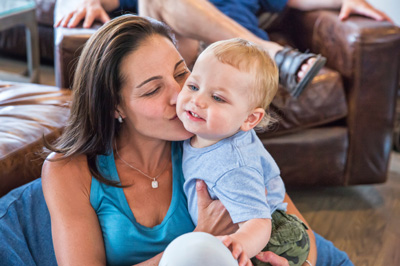When Parenting Begins Does Socializing Have to End?
Permanent link All Posts
"How about that," remarked my friend Sharon to Rose and I as we were heading out the door, balancing a toddler, diaper bag and empty serving bowl, "I think we managed to have some sort of an adult conversation today."
She was right -- it was pretty novel to be leaving a meal with five adults and five kids under the age of five and realize we talked about anything of substance. And by sort of adult conversation, she meant that we carved out five minutes of non-kid related, uninterrupted conversation to talk about our recent trip to Israel. Those readers with kids probably understand the reason to celebrate this. But for those without little ones, let me describe how an afternoon like this typically works, so you can appreciate the milestone we achieved.
Let's use the example of going to a friend's house for a few hours over lunch on Saturday afternoon as an example. Here is how the time spent might break down in order of most to least amount of time spent on something. Recognizing that different parents always handle these things differently, I also indicated what more experienced parents do in order to make each of these pieces of the afternoon go more smoothly and free up time to actually eat and socialize as adults.
37 minutes dealing with interruptions from kids:
This comes in a variety of ways and ranges from asking for more of what is already on the table like grape juice, demanding to have something that's not on the table like chicken nuggets, or just making noises because food was dropped. Littler ones also like to bang on the table and toddlers love to grab their parents' arms with their hands that are covered in something sticky. For this reason, experienced parents don't wear long sleeves.
34 minutes trying to make sure that your child is eating.
This ranges from getting bibs to rolling up sleeves to cleaning up spills to cutting up food, encouraging more bites or reminding the kid to chew and swallow between bites. Experienced parents have actually given most of this up altogether, figuring if the kid is hungry the kid will eat.
24 minutes talking about poop, potty and diapers and all things about kids' biological functions.
This is actually how every conversation goes as a parent. All parents act this way no matter how experienced.
22 minutes getting everyone settled, arranged and set up at the table.
There are boosters and high chairs to juggle, seating arrangements to play with and questions about who can drink out of what type of cup. Experienced parents offer to help set the table.
19 minutes checking if that is my kid crying, yelling, making noise or just figuring out where is my kid?
This involves a lot of getting up -- usually mid-sentence -- to respond to cries and crashes from the other room. Experienced parents also know to fear unusual calm and silence. "Where's Johnny? It's very quiet in there. Oh here he is in the kitchen, helping himself to fistfuls of cake. How does everyone feel about fruit for dessert?"
17 minutes saying goodbye and getting ready to leave
This is because you have to look all over for shoes, toys, and collect all of your other things and change a last minute diaper after everyone is ready to go. Experienced parents pack light.
12 minutes eating
It's hard to believe that over the course of the entire meal that is all that is left for actual food consumption by the parents. Experienced parents eat a snack before they come and, as stated above, don't worry as much about their own kid eating .
9 minutes dealing with a big incident or meltdown (that feels like 90, by the way).
This can be a real tough part for everyone and experienced parents know better than to stare. Their kid actually does look like that when he acts up and staring like they have never seen a tantrum of that size only makes everyone feel worse about it.
All of that leaves about five minutes for having a grown up conversation about nothing related to children. If you are keeping tabs, that's about 3% of the total time spent. The reality of having young kids pretty much changes the paradigm of what it means to have social time. Looking at the breakdown above, it might seem that as parenting begins, socializing with other adults ends.
However, the truth about all of this is that I absolutely love it. I really wouldn't have it any other way. Children have a way of naturally breaking up every routine you could have possibly ever had. In my experience, the challenge of parenting is not to get on top of any type of routine but simply to embrace the idea that the structure you have set up for your family's day is subject to change at any second. Going through that day in and day out helps me to expect all of the unexpected challenges that come my way during the rest of my week when I am not actually parenting. It's a perspective that I hope stays with me long after my kids are grown and having to experience this as parents for themselves.



.jpg)



